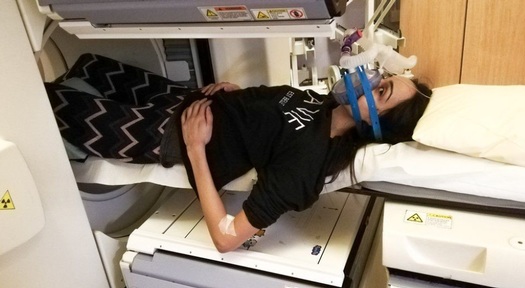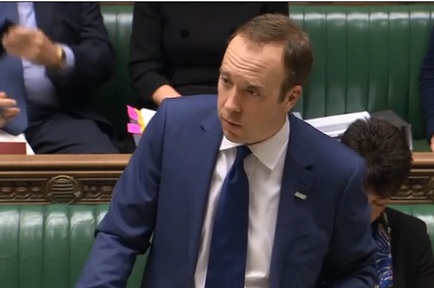Aspiring yoga teacher 'breathless and exhausted' is one of 2 million with long Covid
“I woke up gasping for air suddenly,” says 31-year-old aspiring yoga teacher Jasmine Hayer recalling a night-time assault of long Covid.

She is one of the earliest people to contract Covid-19 and one of the longest-standing cases in the UK. Jasmine Hayer is also one of over two million people in England believed to have had long Covid, according to research by Imperial College London.
Doing downward dog…was like a ‘firestorm’ in my lungs
The yoga enthusiast had no existing illnesses and described herself as fit and healthy before catching Covid-19.
But now, writing in her blog (@mylongcoviddiaries), she says: “Doing one downward dog leaves me short of breath, with what I can only describe as feeling a firestorm moving through my lungs.
“Despite the fact that I’ve been used to practising intense yoga and was even preparing myself for a yoga teacher training course, my health is not what it used to be.
"The same yoga poses that I used to perform with ease and for long periods of time, now leave me breathless and exhausted.”
Jasmine Hayer’s symptoms started on 14 March 2020.
Her first week of having Covid-19 involved flu symptoms but no cough. By day five, she had lost her sense of smell and taste which lasted two months and on day seven, her breathing problems began.
She describes experiencing “eight days of intense breathlessness” and the feeling of a clamp on her chest.
She and her flatmate caught Covid at the same time and she says: “Meditation and yogic breathing were our weapons to push our breath down to our diaphragm, yet thirty minutes later and the virus would push it back up.”
PTSD flashbacks and uncontrollable crying
Jasmine describes talking her first ‘normal breath’ three weeks later and the relief brought on post-traumatic stress disorder (PTSD) with flashbacks, nightmares, anxiety and uncontrollable crying.
She says the ‘brain fog’ she got, left her spending hours trying to write a simple email. “Back in March, I experienced such severe brain fog that it took me three hours to write a five minute email."

On 2 May 2020, she says “I woke up gasping for air suddenly.”
After that she became “so short of breath; walking just 100m left my body feeling as though I’d just run a 10k.
“I could barely walk around the house because each step I took made my lungs feel as though they were on fire. Last June [2020], 10 minutes of stretching left me bed bound for a week.
“I practice, study and teach meditation, so I’ve learnt how to disassociate from my thoughts and emotions. However, months after getting Covid-19, she was hit with an ”avalanche of negative thoughts".
She lost her appetite, lost weight and "I was so exhausted that I couldn’t even talk". She says "Throughout my entire life, I’ve had a talent for falling asleep in minutes...yet now I suffer from insomnia.”
'It felt like I was dying'
On 22 November 2020, she went for a long walk but “an hour later, the ‘firestorm’ started…ripping through my lungs with a sharp pain in my heart. It felt like I was dying.
“It’s the most helpless feeling that I’ve ever experienced." She describes ‘long-Covid’ as a nightmare with "unexpected plot twists" in the form of relapses. "My lungs felt and still feel like they’re attacking themselves whenever I move."
The 'firestorm' happens she says an hour or more after walking or talking for longer periods of time. After a relapse happens she is bed bound for a week and it takes months for her to work her way back up to walking for just 10 minutes or talking for 30 minutes again. 
'Long haulers' experience unexplainable new symptoms
The 31-year-old says she wanted to tell her long Covid horror story to educate people about what the condition is actually like.
“Long Covid sufferers, known as ‘long haulers’ experience unexplainable new symptoms, relapses and the complete rewiring of our previously normal health.
“People are misled into thinking ‘old people get it badly, young people get it mildly and a few are left feeling tired afterwards’. Those getting it ‘mildly’ are left severely debilitated for many months on end and others are left with organ damage.”
Over two million in England thought to have had Long Covid
The National Institute for Clinical Excellence describes long Covid as: ‘signs or symptoms that develop during or after an infection consistent with COVID-19 that continue for more than 12 weeks and are not explained by an alternative diagnosis.'
Over two million people in England are thought to have had one or more COVID-19 symptoms lasting at least 12 weeks , reveals the REACT-2 study involving Imperial College London.
The study's findings suggest long Covid increases with age. It also shows long Covid is higher among women, people who are overweight, those who smoke, live in deprived areas or had been admitted to hospital. Persistent COVID-19 symptoms were lower in people of Asian ethnicity.
The research is based on self-reported information from 508,707 adults aged 18+ (gathered between September 2020 and February 2021).
The study paper stated: ‘Long COVID ‘remains a poorly defined syndrome' and 'there is uncertainty about...the extent of the resultant public health burden, with estimates of prevalence and duration varying widely.’
Professor Paul Elliott, director of the REACT programme at Imperial College London, said: “Long Covid is still poorly understood but we hope through our research that we can contribute to better identification and management of this condition."
'We are learning more about long Covid all the time'

To help people with long Covid, the NHS has opened over 80 long Covid assessment services in England.
The NHS published a £100 million plan to give more support for long Covid recovery. This includes £30 million to help GPs improve diagnosis and care for patients with long Covid.
Health and Social Care Secretary, Matt Hancock said: “We are learning more about long COVID all the time and have made £50 million of research funding available to support innovative projects, with clinics established across the country to help improve the treatment available.”
Trade union body the TUC has said long Covid should be treated as a disability because workers need legal protection from discrimination.
A TUC-commissioned poll of 3,500 people, reveals most people with long Covid symptoms had experienced discrimination at work.
Workers faced suspicion from bosses who questioned the impact of long Covid in 19 per cent of cases, while some did not believe they had long Covid (13 per cent of responses).
Jasmine says the Government’s narrative that people either ‘contract covid’, ‘die’ or ‘recover’ — is "misleading and it needs to change".
She believes three statistics are needed in the pandemic: 1) New cases, 2) Tragic deaths, 3) And those left debilitated as a result of Covid.
She is encouraging the public to sign this petition urging the Government to officially #CountLongCovid patients and present them to the public.
Now 15 months after catching Covid-19, Jasmine has just been diagnosed with post-covid 19 pericarditis - aka heart inflammation. She says: “When people ask me ‘if I’m feeling better’ or ‘what does long Covid feel like’, I honestly don’t know how to describe the enormity of the rollercoaster.”
If you’re struggling with long Covid, you can visit the NHS’ ‘Your Covid Recovery’ rehab centre.
Latest News
 29-Jul-24
Dementia Bus gives carehome.co.uk staff insight into life with dementia
29-Jul-24
Dementia Bus gives carehome.co.uk staff insight into life with dementia
 27-Jul-23
UK's top home care agencies in 2023 revealed
27-Jul-23
UK's top home care agencies in 2023 revealed
 30-Nov-22
A quarter of older people keep their falls secret from family
30-Nov-22
A quarter of older people keep their falls secret from family
 29-Nov-22
'Covid-19 has not gone away' say terminally ill
29-Nov-22
'Covid-19 has not gone away' say terminally ill
 28-Nov-22
IT consultant who received poor care opens 'compassionate' home care business
28-Nov-22
IT consultant who received poor care opens 'compassionate' home care business